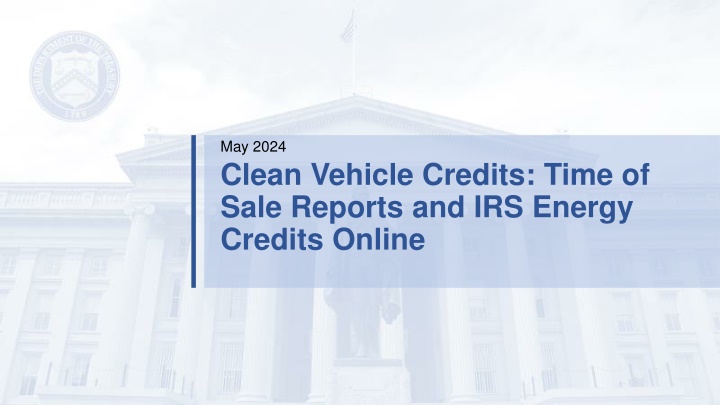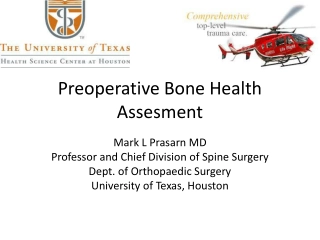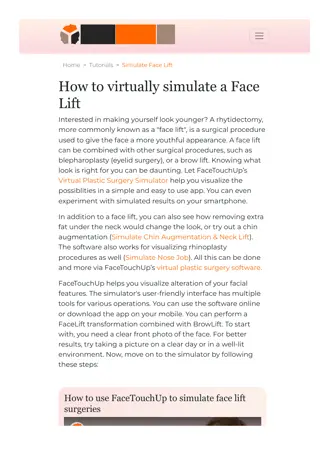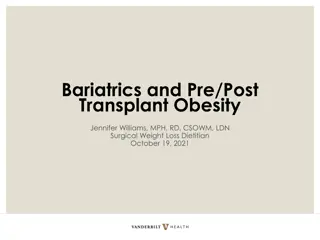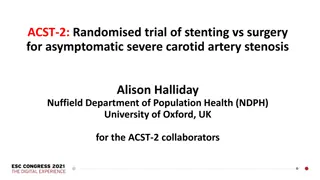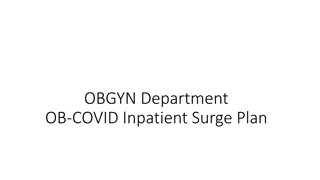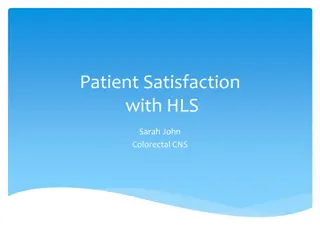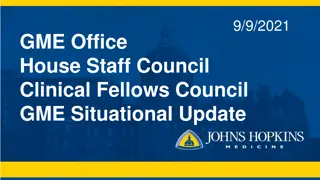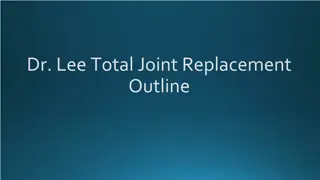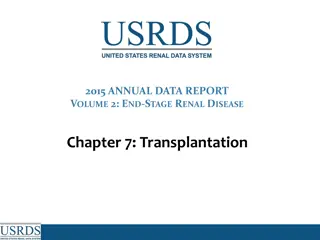Helping Patients Prepare for Surgery During COVID-19
Your patients' well-being is our top priority. Get the guidance you need to resume surgical operations safely. Download the discussion guide provided by the American College of Surgeons to facilitate important conversations with your patients and address their concerns as hospitals and practices begin to resume operations post COVID-19. Ensure that you and your patients are prepared with the necessary information and communication strategies.
Download Presentation

Please find below an Image/Link to download the presentation.
The content on the website is provided AS IS for your information and personal use only. It may not be sold, licensed, or shared on other websites without obtaining consent from the author.If you encounter any issues during the download, it is possible that the publisher has removed the file from their server.
You are allowed to download the files provided on this website for personal or commercial use, subject to the condition that they are used lawfully. All files are the property of their respective owners.
The content on the website is provided AS IS for your information and personal use only. It may not be sold, licensed, or shared on other websites without obtaining consent from the author.
E N D
Presentation Transcript
May 2024 Clean Vehicle Credits: Time of Sale Reports and IRS Energy Credits Online 1
Background The Inflation Reduction Act (IRA) of 2022 makes the largest investment in clean energy in United States history, and much of that investment is delivered via tax incentives. The Inflation Reduction Act includes tax incentives for a broad range of activities that support building a clean energy economy, including tax credits for new and previously-owned clean vehicles. Over 13,000 dealers have registered to take advantage of these credits already, enabling buyers to transfer the credits to dealers through IRS Energy Credits Online. More than 100,000 credits have been transferred at the point of sale, representing more than $700 million in upfront savings for consumers. For vehicles placed in service January 1, 2024, or later, dealers and sellers must register with IRS Energy Credits Online (IRS ECO) and use the tool to electronically submit time-of- sale reports. This presentation discusses the Clean Vehicle Tax Credits, including the Clean Vehicle Credit (30D) and the Previously-Owned Clean Vehicles Credit (25E), and IRS ECO. 2
Agenda I. Disclaimers II. Clean Vehicle Tax Credit Background and Guidance III. Registering with IRS Energy Credits Online IV. Time-of-Sale Submissions V. What s Ahead: IRS ECO Updates VI. Resources 3
Disclaimers This deck provides an overview of certain Inflation Reduction Act tax provisions for general informational purposes only and is not itself tax guidance. This deck relies on simplifications and generalizations to convey high-level points about the Clean Vehicle Tax Credits as authorized in the Inflation Reduction Act. Please refer to guidance issued by the IRS for detailed information on the rules associated with the credit. 4
Agenda I. Disclaimers II. Clean Vehicle Tax Credit Background and Guidance III. Registering with IRS Energy Credits Online IV. Time-of-Sale Submissions V. What s Ahead: IRS ECO Updates VI. Resources 5
Clean Vehicle Tax Credit Overview Clean Vehicle Tax Credits: As of January 1, taxpayers may be able to claim a tax credit of up to $7,500 for purchasing and placing into service an eligible new clean vehicle and up to $4,000 for purchasing and placing into service an eligible previously-owned clean vehicle, in IRS ECO. Information about eligible vehicles is available at FuelEconomy.gov. For more on vehicle, buyer, and seller eligibility and requirements, see IRS.gov/CleanVehicles. IRS Energy Credits Online Requirements: For vehicles placed in service January 1, 2024, or later, dealers must register with IRS Energy Credits Online and use the tool to electronically submit time- of-sale reports. Buyers will not be able to claim a clean vehicle tax credit if the dealer has not registered and does not successfully submit a time of sale report to IRS Energy Credits Online. IRS Energy Credits Online will accept or reject submitted time-of-sale reports from the registered dealer in real-time, including checking the VIN for each time-of-sale report against a list of eligible VINs manufacturers have provided the IRS. Buyers and dealers should receive online confirmation of a successfully submitted time-of-sale report before final sale. 6
Clean Vehicle Credit under 30D The Inflation Reduction Act made several changes to the Clean Vehicle Credit of the Internal Revenue Code (IRC 30D) for new qualified plug-in electric vehicles or fuel cell vehicles. Eligible vehicles may qualify for a tax credit of up to $7,500. Income limits generally apply to non-corporate taxpayers ($300,000 for joint filers, $225,000 for head of households, $150,000 for all other taxpayers). Vehicle Requirements Seller Requirements Gross vehicle weight rating of less than 14,000 pounds; Final assembly in North America; Minimum battery capacity of 7 kilowatt hours; Vehicles must be made by a qualified manufacturer; MSRP limitations apply, based on the type of vehicle ($80,000 for Vans, Sport Utility Vehicles, Pickup Trucks, and $55,000 for other vehicles); For vehicles placed in service on or after April 18, 2023, the credit amount will depend on the vehicle meetingthe critical minerals requirement ($3,750) and/or the battery components requirement ($3,750); Foreign entity of concern (FEOC) battery component restrictions apply to vehicles placed in service January 1, 2024 and after. Additional FEOC restrictions apply to applicable critical minerals contained in the battery for vehicles placed in service starting January 1, 2025 and after. Sellers must provide time of sale reports to IRS using IRS Energy Credits Online. Sellers must also provide a copy to the buyer. Name and taxpayer identification number of the seller Name and taxpayer identification number of the buyer Vehicle identification number (VIN) of the new clean vehicle Battery capacity of the new clean vehicle Verification that the buyer is the original user of the new clean vehicle The date of the sale and the sale price of the vehicle Maximum credit allowable for the new clean vehicle being sold For sales after December 31, 2023, the amount of any transfer credit (advance payment) applied to the purchase 7
Previously Owned Clean Vehicles Credit under 25E The purchase of an eligible previously-owned clean vehicle with a sale price of $25,000 or less may qualify for a tax credit of 30% of the sale price up to a maximum credit of $4,000. Vehicle: Seller: Buyer: Licensed dealer Sale price of $25,000 or less (does not include separate financing, extended warranties, insurance, and separately- stated taxes and fees required by State or local law) Modified adjusted gross income limitation: Reports required information to IRS using IRS Energy Credits Online and provides the buyer a copy of the report. Joint filers: $150,000 Heads of households: $112,500 Name and taxpayer identification number of the dealer The model year of the vehicle is at least two years earlier than the calendar year in which a taxpayer acquires the vehicle All other filers: $75,000 Buyer is not the original owner Name and taxpayer identification number of the buyer Purchase of the vehicle was by an individual for use and not for resale Gross vehicle weight rating of less than 14,000 pounds and an eligible vehicle with a battery capacity of least 7 kilowatt hours Vehicle identification number (VIN) Buyer cannot have claimed another used clean vehicle credit in the 3 years before the purchase date Battery capacity The sales price of the vehicle Not have already been sold as a used vehicle after August 16, 2022, based on the vehicle history report Placed in service date Buyer cannot be claimed as a dependent by another taxpayer Maximum credit allowable 8
Transfer of Credit and Advanced Payment Dealer Information: As of January 1, 2024, buyers can choose to transfer a clean vehicle credit to a registered dealer in exchange for an equivalent reduction in the purchase price of the vehicle. That means eligible buyers can get money upfront for buying a clean vehicle, rather than having to wait to claim their credit on their tax return for the year the vehicle was placed in service. Dealers must register with the IRS before they can participate. Wait until your dealership has successfully registered for advance payments before you conduct transactions that transfer tax credits at the time-of-sale. When a buyer transfers a tax credit, registered dealers must provide certain disclosures (such as the disclosure regarding modified AGI limitations) and receive attestations from the buyer. The IRS will pay registered dealers electronically for transferred clean vehicle tax credits. Dealers generally will be in the same federal income tax position as if no credit transfer or advance payment occurred. Advance payments received by the registered dealer are not treated as a tax credit to the dealer and may exceed the dealer's regular tax liability. Advance payments received by the registered dealer are not included in the gross income of the dealer. 9
Transfer of Credit and Advanced Payment (continued) Buyer Information: Registered dealers are not required to verify a buyer s income. The buyer is responsible for repaying the full amount of any transferred credit when they file their tax return if they exceed the income limitations for the tax credit at tax filing. Eligible buyers may transfer the full value of the new or previously owned clean vehicle credit regardless of their individual tax liability. Eligible buyers may make no more than two elections to transfer a clean vehicle credit each tax year. Such elections could be two Clean Vehicle Credits or one Clean Vehicle Credit and one Previously Owned Clean Vehicle Credit, but cannot be for two Previously Owned Clean Vehicle Credits. Accordingly, spouses may each transfer no more than two Clean Vehicle Credits each tax year. 10
Agenda I. Disclaimers II. Clean Vehicle Tax Credit Background and Guidance III. Registering with IRS Energy Credits Online IV. Time-of-Sale Submissions V. What s Ahead: IRS ECO Updates VI. Resources 11
Reminder: What is IRS Energy Credits Online? If you're a car dealer or seller, this tool is for you. Clean vehicle sellers and licensed dealers must use IRS Energy Credits Online for their customers to successfully claim or transfer the new or previously owned clean vehicle credit for vehicles placed in service January 1, 2024, or later. IRS Energy Credits Online allows dealers and sellers of clean vehicles to complete this entire process online. It's a simple and safe way to verify your identity, submit time of sale reports, and register for advance payments. 12
IRS Energy Credits Online Registration Each Registration step in IRS Energy Credits Online is important: Time of Sale Reporting Your Dealership Advance Payments Register for Time of Sale Create an account so you can Register your dealer to receive reporting so you can submit register as a dealer/seller in IRS advance payments for transferred required reports ECO clean vehicle credits We will review each of these steps 13
IRS Energy Credits Online Benefits Automatically prepares a time Confirmation that a specific Real-time IRS approval and of sale report for dealer to VIN is eligible for the credit rejection of time of sale provide the buyer and the amount of the credit* reports No additional end-of-year Multiple users; control who Fast and secure electronic- time of sale reporting for can represent your payment delivery 2024 onwards organization * IRS Energy Credits Online does not confirm the buyer s eligibility. For previously owned clean vehicles, the dealer will need to review the vehicle history report and attest to the vehicle s eligibility as a first qualified sale. IRS ECO will confirm the max allowable credit for a new clean vehicle. For used clean vehicles, the amount of the credit is dependent on the sales price. 14
Dealer Registration Dealers and sellers must register with IRS ECO for their buyers to claim clean vehicle credits. More than 13,000 dealers have registered. Registration will include: Contact information Licensing information Associated documents Required attestations Refer to the IRS User Guide for more detail: https://www.irs.gov/pub/irs-pdf/p5867a.pdf. Note: All data in the screens displayed in this presentation is notional. The example is illustrative and does not represent a real entity. 15
Advance Payment Registration Registration for advance payments allows the dealer to request an advance payment for transferred credits when submitting a time- of-sale report. Most registered dealers have registered for advance payments. Requirements: Only licensed dealers are eligible for advance payments. The dealership must be in tax compliance. Banking information is required for advance payments. This should be the appropriate bank account for the dealership. Note: Once bank account information is entered it cannot be changed at this time. There is a 15-day minimum waiting period after registration before an advance payment request can be submitted. Dealers that have not been approved for advance payment should not reduce the purchase price of a vehicle in anticipation of later submitting an advance payment request with respect to a clean vehicle sale. 16
Time of Sale Reporting - Real-time Confirmation IRS Energy Credits Online will accept or reject time-of-sale reports in real time. An accepted submission means a qualified manufacturer has submitted the VIN listed in this report to the IRS as an eligible vehicle. Dealers and sellers must provide a copy of this time-of-sale report to buyers. Buyers will need the information on the time-of-sale report to claim or reconcile a Clean Vehicle Credit on the income tax return for the year the vehicle is placed in service. The buyer that can claim the clean vehicle tax credit must use their legal name listed with the Social Security Administration. The IRS is promptly paying dealers once a time-of-sale report with an advance payment request is submitted and accepted by the IRS (deposits typically occur within 48-72 hours after the expiration of the 48-hour void period for a successful request) 17
Agenda I. Disclaimers II. Clean Vehicle Tax Credit Background and Guidance III. Registering with IRS Energy Credits Online IV. Time-of-Sale Submissions V. What s Ahead: IRS ECO Updates VI. Resources 18
Frequently Asked Questions on IRS.gov Q: Are dealers liable to repay the advance payment if the purchaser exceeds the applicable income limits? Are dealers required to verify a purchaser s income in order to receive an advance payment? A: Dealers are not required to verify a purchaser s income for a credit transfer or advance payment and are not required to repay the advance payment if the purchaser exceeds the income limits. Dealers are required to disclose information about the applicable income limits to the purchaser, who must attest that he or she expects to qualify for the credit. To assist dealers with their disclosure obligations, the IRS published a sample disclosure form. Q: What if a buyer has insufficient tax liability to fully use a transferred credit? A: The amount of the credit that the electing taxpayer elects to transfer to the eligible entity may exceed the electing taxpayer s regular tax liability for the taxable year in which the sale occurs, and the excess, if any, is not subject to recapture from the dealer or the buyer. Q: What is the first transfer rule for purposes of being a qualified sale of a previously owned clean vehicle? A: It is the first transfer of the vehicle after Aug. 16, 2022, of the Previously Owned Clean Vehicle Credit other than to the person who was the original user of the vehicle. The original user s sale of the vehicle to a dealer or a subsequent dealer does not negate the vehicle s eligibility for the credit under the first transfer rule. As described in Topic J FAQ 2, sellers will review vehicle history reports when making attestations regarding the vehicle s eligibility and submitting seller reports. Q: If my dealership runs into difficulty at any point in the registration process, who should I contact? A: Please contact IRS.Clean.Vehicles.Dealer.Info@IRS.gov with questions. 19
Dealer Resources Buyer Resources IRS Time-of-Sale Reporting User Guide: For step-by-step information and screenshots of the time-of-sale reporting process in IRS ECO. New Clean Vehicle Tax Credit Checklist and Used Clean Vehicle Tax Credit Checklist: Outlines requirements for buyers seeking to purchase a clean vehicle and qualify for the New or Previously Owned Clean Vehicle Tax Credit. IRS Dealer Registration User Guide: For step-by-step information and screenshots of the dealer registration and advance payment registration processes in IRS ECO. IRS ECO Dealer Overview: Overview of IRS ECO process. Search for Eligible Vehicles on Fueleconomy.gov: For information regarding vehicle eligibility, including search function Transfer of Credit Information and Disclosures: Provides information about information and disclosures dealers must provide buyers. Clean Vehicle Credit Seller or Dealer Requirementsand FAQs: For more information on general dealer requirements and policies. IRS.gov/CleanVehicles: IRS Website containing general information about the Clean Vehicle Tax Credits. Dealers can sign-up to receive updates via an IRS e-News Subscriptions here.Select e-news for business and sign-up for e-news for clean vehicle industry. Example Time of Sale Reports (New, Used): What to expect to receive from the dealer when purchasing a clean vehicle and claiming a credit. Dealers can reach out to the IRS clean vehicles dealer email for help with specific issue: irs.clean.vehicles.dealer.info@irs.gov 20
Appendix 21
Clean Vehicle Time of Sale Report Sample Note: All data in the screens displayed in this presentation is notional. The example is illustrative and does not represent a real entity. 22
